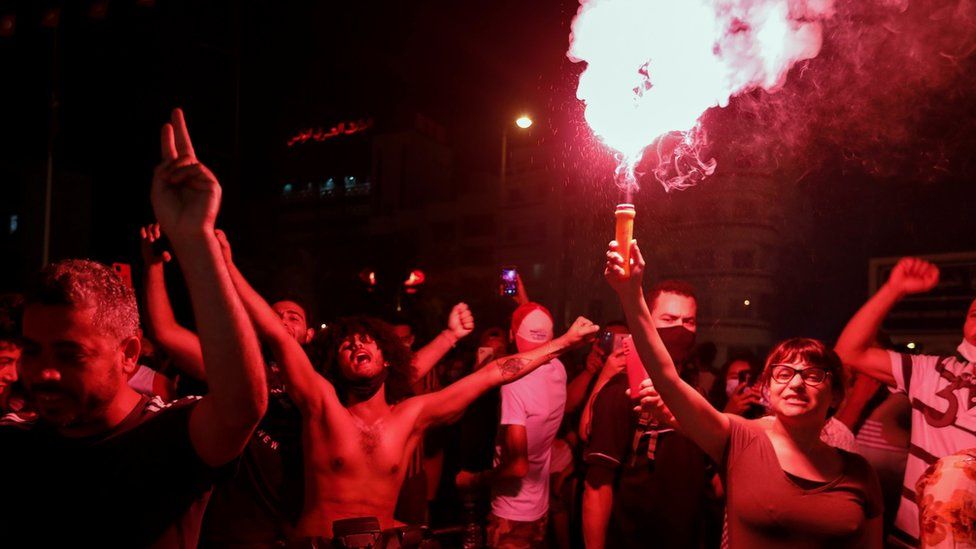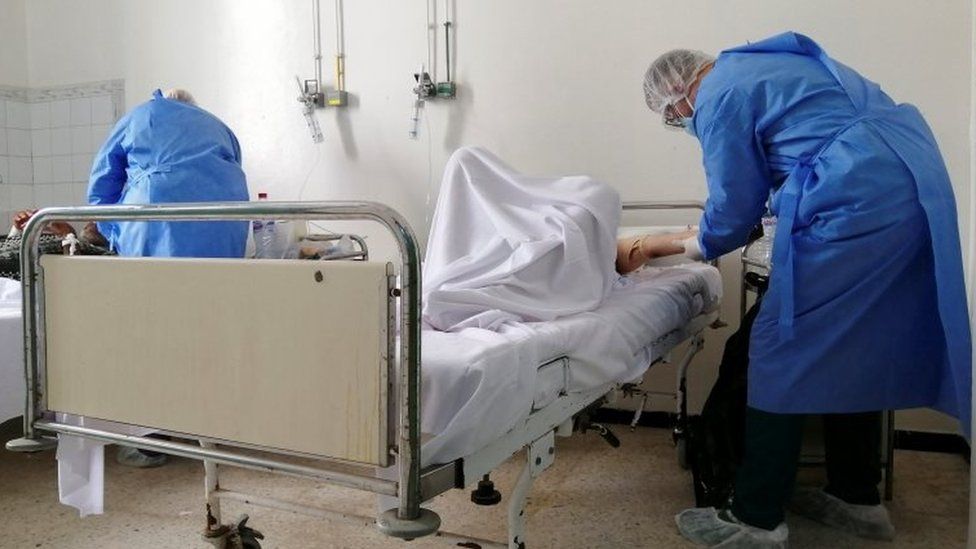Tunisia’s president has sacked the prime minister and suspended parliament, after violent mass protests nationwide on Sunday.
Anger over the government’s handling of a massive recent spike in Covid cases has added to general unrest over the nation’s economic and social turmoil.
President Kais Saied, who was elected in 2019, announced he was taking over.
His supporters erupted in celebration, but opponents in parliament immediately accused him of staging a coup.
Mr Saied, an independent, has had a long-standing feud with the man he has removed, PM Hichem Mechichi. Mr Mechichi has the backing of the largest party in parliament, Ennahda.
Tunisia’s revolution in 2011 is often held up as the sole success of the Arab Spring revolts across the region, but it has not led to stability economically or politically.
The recent coronavirus surge has fuelled long-standing public frustration. The health minister was sacked last week after a bungled vaccination campaign.
Statesman or dictator?
On Sunday thousands of people across Tunisia demonstrated against the PM and Ennahda, the moderate Islamist ruling party.
Security forces in the capital, Tunis, blocked off parliament and streets around the central Avenue Bourguiba. Protesters stormed Ennahda offices, smashing computers and setting fire to its local headquarters in the south-western city of Touzeur.
One protester in Tunis, Lamia Meftahi, told Reuters news agency that this was “the happiest moment since the revolution”.
Another in the town of Gafsa told Agence France-Presse the president had “shown himself to be a true statesman”, but a second resident there said: “These fools are celebrating the birth of a new dictator.”
The unrest continued into the early hours of Monday, as the speaker of parliament, Rached Ghannouchi, who leads Ennahda, tried to get into the legislature in Tunis.
He was blocked by those who supported Mr Saeed’s move, and responded with a sit-down protest with his own loyalists. The two sides threw stones at each other.

Earlier, in a televised address, Mr Saied said: “We have taken these decisions… until social peace returns to Tunisia and until we save the state.”
He later joined the celebrating crowds in Tunis.
President Saied also vowed to respond to further violence with military force.
“I warn any who think of resorting to weapons… and whoever shoots a bullet, the armed forces will respond with bullets,” he said.
Coup accusations
In Tunisia, both the president and parliament are elected by popular vote.
Under the constitution, the president oversees only the military and foreign affairs, but Mr Saied has long been in conflict with Mr Mechichi.
Mr Saied has said he will now govern alongside a new PM, with parliament suspended for 30 days.
The president cited Article 80 of the constitution for his actions, saying it allowed him to suspend parliament if it was in “imminent danger”.
But the opposition disputes this, and Tunisia’s legal and political framework is unclear. The 2014 constitution calls for a special court to be set up to decide disagreements like this, but it has not been established.
As the largest party in parliament, Ennahda has the right to nominate the PM. It denounced the president’s move.
Speaker Ghannouchi accused Mr Saied of mounting “a coup against the revolution and constitution” and called on the Tunisian people to defend them both.
Two other parties, Heart of Tunisia and Karama, echoed the coup accusations.
Ennahda denounced attacks on its offices, blaming “criminal gangs” who were trying to “seed chaos and destruction”.
Covid flare-up
Coronavirus-related deaths reached a record for the country last week, passing 300 in one 24-hour period. Tunisia has one of the highest per capita death rates in the world.
Vaccinations have been slow: only 7% of the 11.7 million population are fully vaccinated.
The government attempted to speed up vaccination by opening it to all over-18s during the Eid al-Adha holiday. However, the effort descended into chaos, with stampedes, shortages of supplies, and incidents of violence.

The PM sacked the health minister – an ally of the president – prompting Mr Saied to instruct the military to take over management of the coronavirus crisis.
But Covid is only one factor in the unrest. Tunisia has had nine governments since the 2011 revolution, many of them short-lived or fractured.
Deep-rooted problems of unemployment and crumbling state infrastructure that were behind the uprising have never been resolved.
Tunisia now has budget deficits and debt repayment issues that could require a new loan from the International Monetary Fund (IMF).
But that could hurt Tunisians with the loss of state jobs and reduced subsidies on goods.



No comments:
Post a Comment
Note: only a member of this blog may post a comment.